 Abraham Lincoln
If given the truth, the people can be depended upon to meet any national crisis...
Abraham Lincoln
If given the truth, the people can be depended upon to meet any national crisis...
 Guildford news...
for Guildford people, brought to you by Guildford reporters - Guildford's own news service
Guildford news...
for Guildford people, brought to you by Guildford reporters - Guildford's own news service
40 Years After The Guildford Pub Bombings: A Time For Reflection
Published on: 4 Oct, 2014
Updated on: 31 Jan, 2019
Guildford’s most infamous night in its modern history happened 40 years ago on Saturday, October 5, 1974. It was, of course, the Guildford pub bombings in which five people died and more than 60 were injured.
The two pubs attacked were the Horse and Groom in North Street and the Seven Stars that was in Swan Lane. Both were popular at the time with service personnel from Aldershot and Pirbright Barracks and also from the Women’s Royal Army Corps, based at Queen Elizabeth Camp, Stoughton.
The first bomb exploded at the Horse and Groom pub at about 8.50pm. Thirty-five minutes later the second device went off at the Seven Stars pub. No warnings were given.
The five who lost their lives had been at the Horse and Groom. Four of them were teenagers: Women’s Royal Army Corps (WRAC) personnel Ann Hamilton, 18, of Crewe, and Caroline Slater, 17, of Cannock, both based at the camp in Stoughton. William Forsyth, 18, and John Hunter, 17, were both Scots Guards based at Pirbright. They were from Barrhead, Renfrewshire, Scotland. Civilian Paul Craig, 22, was from Boreham Wood.
As usual, the town was packed that night, and as emergency crews attended to the chaotic scenes, the pubs and the cinemas were quickly evacuated. The first explosion was heard by those in Studio 1 and 2 cinema in Woodbridge Road.
However, many Guildford people learned of what had happened following a newsflash on TV. Even in those days when media communication was much slower than what we are used to today, the news went around the world very quickly.
The Provisional Irish Republican Army had been targeting sites on mainland Britain at the time. It was therefore soon assumed that the carnage that was wreaked in Guildford was the work of the IRA.
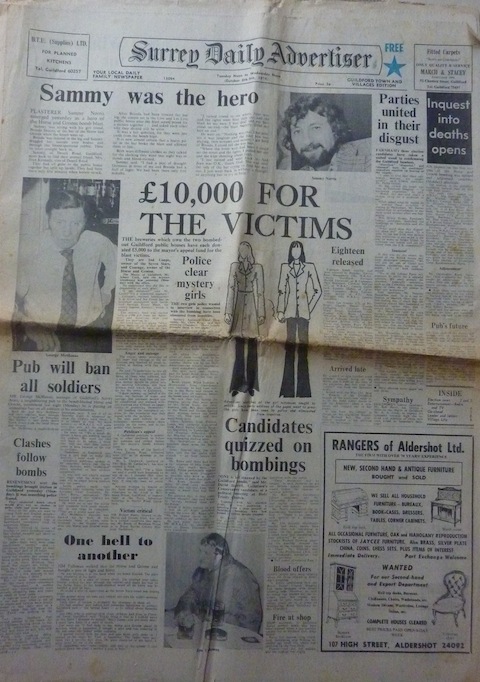
A further edition of the Surrey Daily Advertiser shortly after the bombings with stories linked to the incidents including one about compensation for victims and soldiers being banned from at least one Guildford pub.
As dawn broke on the Sunday and the police investigation began, there was a personal visit by the then Home Secretary Roy Jenkins, who was escorted by the Chief Constable of Surrey, Peter Matthews, along with Scotland Yard’s bomb squad commander Robert Huntley. Guildford MP David Howell, a former Northern Ireland minister, had been to witness the damage late on the Saturday night.
And while the forensic teams and those trying to clear up were about their work, scores of sightseers came to view the scene in the town centre. It seems so very strange today that they were allowed so close – the area was hardly cordoned off at all!
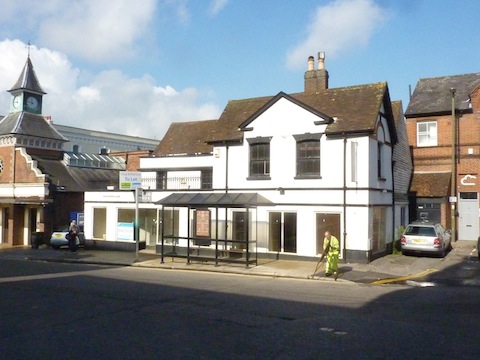
The former Horse and Groom pub is currently empty. More recently it was a shop selling home furnishings.
There are other mysteries as to some of the events that night. It has been reported that the bodies of those who died (as well as other casualties) were taken to the Royal Surrey County Hospital in Guildford and the Cambridge Military Hospital in Aldershot.
But an employee at the time, on night duty within the transport department at St Peter’s Hospital, Chertsey, witnessed five bodies being taken to the mortuary there and was told they were victims of bombings in Guildford.
Women from the WRAC who were in Guildford that night were certainly not stationed at Stoughton Barracks as has been suggested.
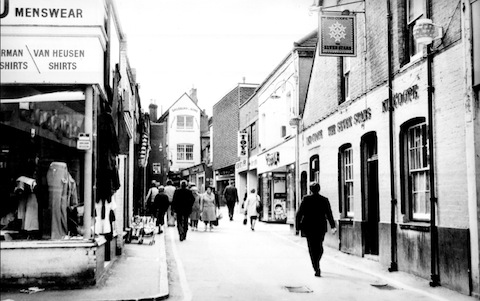
The Seven Stars pub in Swan Lane a few years before it was bombed. Afterwards, it reopened briefly, then becoming an office licence. Today it is two shop units and further along is Costa coffee shop, which at the time of this photo was a branch of Currys.
Guildford Dragon NEWS publisher Martin Giles was in Guildford on the night of the bombings. He recalls: “I was 18 years old and the events of that night are etched on my memory.
“The Horse and Groom pub was not only popular with servicemen, in fact, they did not make up the majority of its customers. It was a popular pub for many youngsters in the town and some older folk too. My group of friends met up and drank there regularly, for about a year, before switching for whatever reason to the Sanford Arms (now Rogues wine bar) on Epsom Road.
“That is where we were on that night. The first sign of anything untoward was a man coming into the pub and saying something about an incident. I think he said that a pub had ‘gone up’ or something like that. I also seem to remember that he had a bandage on his head, although that seems unlikely.
Anyway, we paid little attention to him. Although the Aldershot army camp bombings had taken place a year or so before, no one thought that the IRA would strike in Guildford.
“We dismissed the man as probably drunk, or nuts, and carried on. But shortly afterwards the pub phone rang and Mick the barman said that it was the police and there had been an explosion in a pub and they had ordered him to close up.
“We must have heard that the Horse and Groom was the pub in question because one of my friends was concerned about his uncle who normally drank in there. If he was not there he was likely to be in the “Pig and Tater” in Charlotteville. I had my car so I suggested we try there first to check if he was okay.
“Whilst waiting for my friend to return from the Pig and Tater, I heard a distant explosion. It did not seem that loud but I realised afterwards that it must have been the second device in the Seven Stars. The police order to clear the pubs probably prevented more fatalities there.
“My friend returned still worried. His uncle had not been in the Pig and Tater and had not been seen so it seemed likely he might have been in the Horse and Groom. I said we had better go and check.
“We drove down the upper High Street turned right into Chertsey Street. North Street was closed off although you could look down and see the Horse and Groom with its frontage blasted out. We parked up in Chertsey Street, or nearby, and finding someone official, perhaps an ambulanceman, we explained Brian’s concern about his uncle.
“My recollection is, and I can scarcely believe it myself, that he directed us towards Martyr Road and said that the casualties were there; we could go and check. We went down and I seem to recall we saw some casualties being treated but quickly realised it would not be right or proper to move in among them.
“I have got a feeling that my friend then decided to walk home, he lived in Rupert Road. I ended up with several other friends in the White Lyon in Worplesdon, still open as it was out of town.
“How we communicated that we would be heading there I can’t recall but we did. Of course, all the conversation was about the incident. I was aware that my grandmother would be concerned about me (my mother and sister were away on holiday in Italy). So I went and phoned her from the telephone box opposite the White Lyon. She had feared the worst and was extremely relieved to hear that I was okay.
“It turned out that my friend’s uncle had been walking up North Street to the Horse and Groom when the bomb detonated. He saw one of the casualties thrown on to the street. He decided to return home but, although a veteran of D-Day where he had been shot in the leg, he was beaten up on the way home simply for being Irish. He lost a lot of confidence after that night and rarely ventured out.
“Just over six months later I was in the army myself, not because of the bombing but it had given me an extra insight into the Northern Ireland situation and the conflict in which I would spend a total of three years of my army service engaged.
“I cannot tell you how angry I was a few years later to return on leave to Guildford and be refused service in the Three Pigeons pub simply because I was a serviceman. It was deeply hurtful to me for this to happen in Guildford, my hometown. I still regard it as a cowardly act by the publican involved although, it must be said, he was not alone in his decision.”
In the aftermath of the bombings, Surrey Police began the biggest investigation in its history to find the bombers and bring them to justice. It is said that the Government told the force that in no uncertain terms should those who committed the crimes go unpunished.
The level of its inquiries was far-reaching. For example, at assemblies in local schools in the week that followed appeals were made to anyone who had been in the town that night to come forward if they had any information that might help the inquiry. Pupils were assured that on this occasion a blind eye would be turned if they had been involved in under-age drinking that evening.
It also gave rise to a spate hoax phone calls to schools saying a bomb had been placed and was about to explode. Usually the call was from a pupil playing truant, but nevertheless, schools were evacuated with staff having the job of checking the building assisted by police officers.
It is important to put into context the night of the bombings with the events that followed with the arrests and convictions of four people and their subsequent release from prison 14 years later when appeal court judges found there were doubts about those convictions.
Arrests were soon made and those accused were brought to appear before magistrates sitting in a building in Ward Street, Guildford, just around the corner from the Horse and Groom pub. They were charged there on Monday, December 2, 1974, with the Guildford pub bombings.
Later to be known as the Guildford Four, the trial of Paul Hill, Gerard Conlon, Partick Armstrong and Carole Richardson took place at the Old Bailey and they were subsequently found guilty and given life sentences.
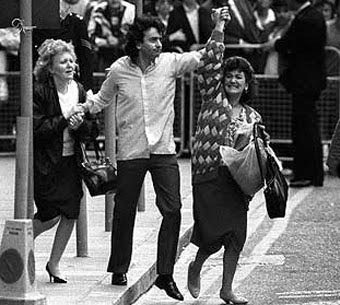
Gerard Conlon outside the Court of Appeal after his and the other members of the Guildford Four’s convictions had been overturned.
It was not long before doubts arose over their convictions with the four also protesting their innocence.
A solicitor based in Guildford, Alistair Logan, began to fight to clear Armstrong and Richardson. In this quest, Mr Logan said that “a conspiracy involving some of the highest people in justice in this land” had put the Guildford Four in prison.
He also claimed that the case had never been fully reported in the national press. During the trial, it is believed that only the Surrey Advertiser covered it in full by having a reporter in the courtroom throughout.
Finally, in 1989 the Court of Appeal overturned the convictions and the Guildford Four were free. Pictures of them standing outside the court with friends and relatives flashed around the world. It was front-page news and once again Guildford, albeit by association only, was again in the spotlight.
Their release was followed by further books about the Guildford Four and associates, and in 1993 the film In The Name Of The Father, starring Daniel Day Lewis as Gerard Conlon, was released. The film was based on Mr Conlon’s autobiography.
Gerard Conlon was born in Belfast in 1954. He died on June 21, 2014, in his hometown after a long battle with throat cancer.
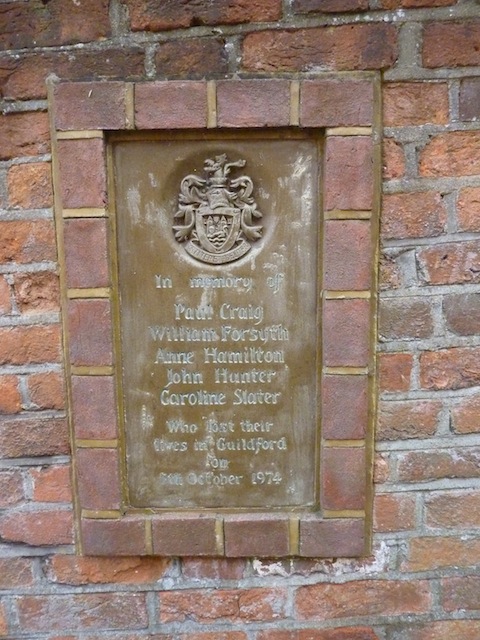
The memorial to the five who died as a result of the Guildford pub bombings can be seen in Quakers’ Acre.
Now, with the passing of time, it is important to sometimes look back on a very dark and sad night in Guildford’s history. Neither of the two pubs operates as licensed houses today, although both did re-open, the Seven Stars only briefly.
There is little in the town to tell people of the events of Saturday, October 5, 1974. A plaque naming those who died is tucked away in the small garden known as Quakers’ Acre in North Street, opposite the former Horse and Groom pub.
It has been in place for some time, but how many know it exists? There was debate over whether it should be placed at all, and interestingly, while it names the five who lost their lives and the date, the reason why is not given. For that, you have to seek out another plaque (more visible) on the gatepost of Quakers’ Acre facing North Street.
The town centre parish of Holy Trinity and St Mary’s Churches considers it right to remember and pay respects to the five young, innocent people who died in the Guildford pub bombings and those who were affected by it.
It is holding a service at Quakers” Acre on Sunday afternoon, October 5, at 4pm, to which all are welcome.
Responses to 40 Years After The Guildford Pub Bombings: A Time For Reflection
Leave a Comment Cancel replyPlease see our comments policy. All comments are moderated and may take time to appear.
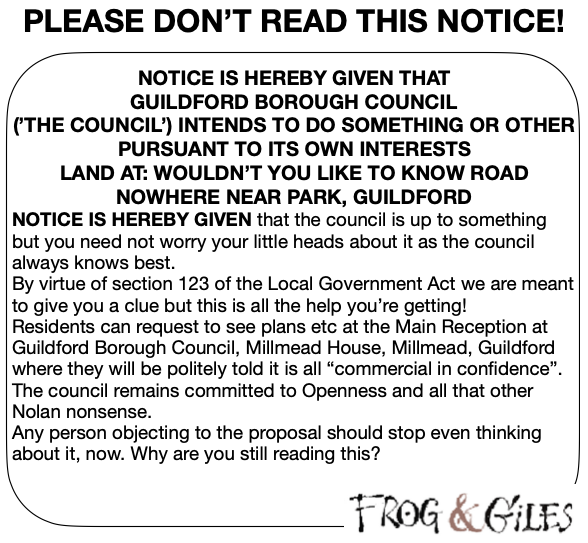
See Dragon story: GBC’s Explanation of Major Land Sale Notice Error ‘Borders on Arrogant’ Says Councillor
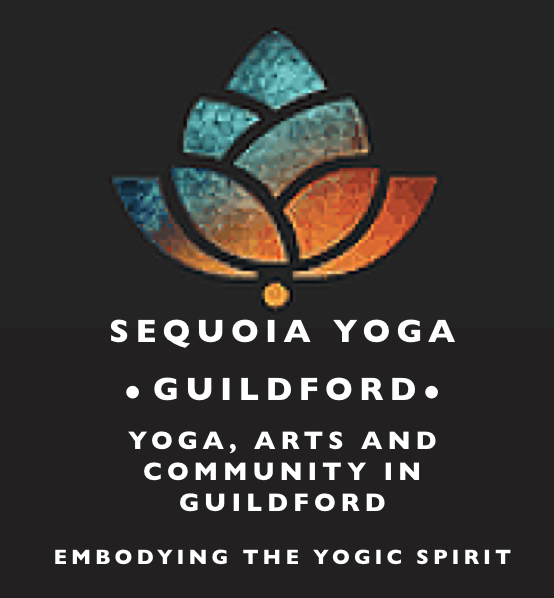

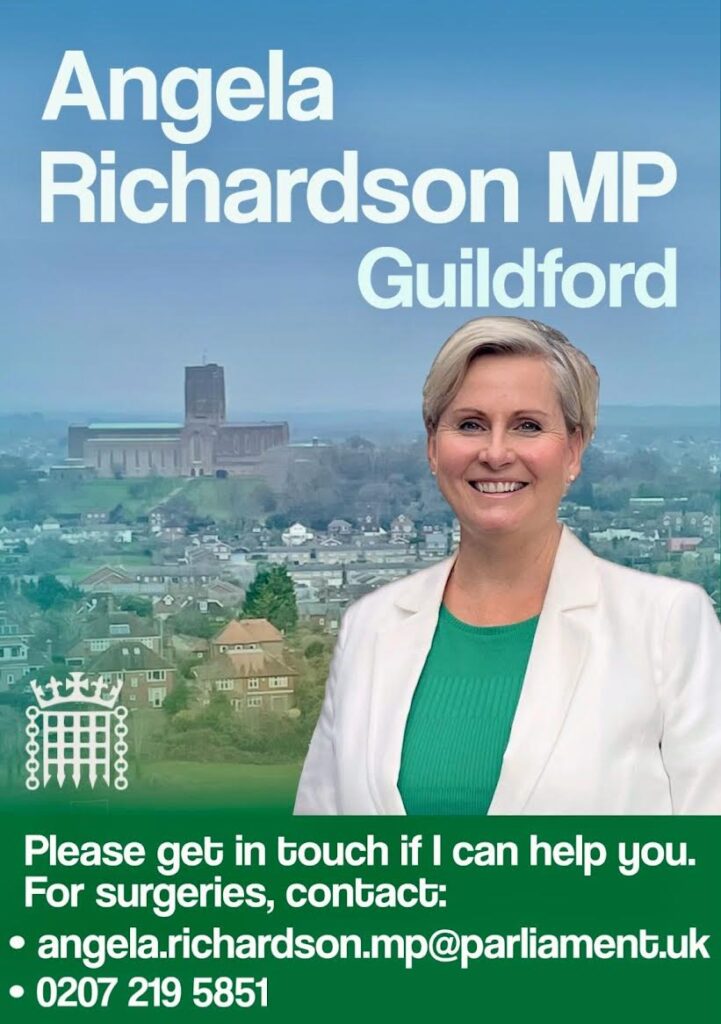


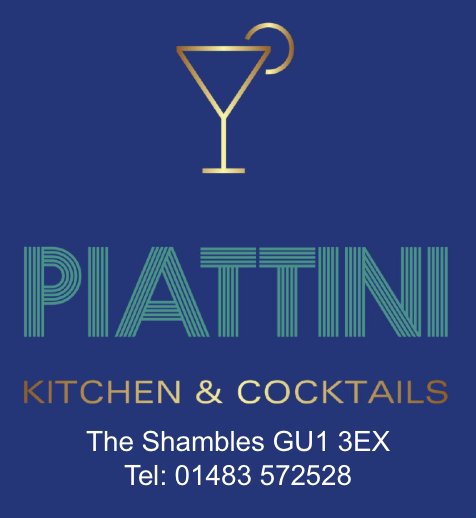

Recent Articles
- Great Post Office Scandal Reporter Coming to Guildford
- Woking Wipeout for Conservative Councillors
- City and Manager ‘Part Company’ After Slide in Results
- PCC Election Result – Conservative Lisa Townsend Retains Commissioner Role
- Letter: It’s a Sad State of Affairs
- Times Rankings Showing GBC To Be Worst Council in Surrey Dismissed by Lib Dems
- Birdwatcher’s Diary No.303
- Letter: What a Scoop!
- Filmfest – a Festival of German Films
- Letter: Help Abroad Should Not Be to the Detriment of Those Here


Recent Comments
- Frank Emery on Latest Figures Show Two in Every Three Burglaries Went Unattended in Surrey
- Sara Tokunaga on Surrey Schools Could Have ‘Meat-free Mondays’ If Strategy Adopted
- John Lomas on Letter: Jeremy Hunt Has Not Engaged With Ash Parish Council As Claimed
- Jane Austin on Letter: Jeremy Hunt Has Not Engaged With Ash Parish Council As Claimed
- David Humphries on Letter: It’s a Sad State of Affairs
- David Roberts on Letter: Help Abroad Should Not Be to the Detriment of Those Here
Search in Site
Media Gallery
Dragon Interview: Local Artist Leaves Her Mark At One of England’s Most Historic Buildings
January 21, 2023 / No Comment / Read MoreDragon Interview: Lib Dem Planning Chair: ‘Current Policy Doesn’t Work for Local People’
January 19, 2023 / No Comment / Read MoreA3 Tunnel in Guildford ‘Necessary’ for New Homes, Says Guildford’s MP
January 10, 2023 / No Comment / Read More‘Madness’ for London Road Scheme to Go Ahead Against ‘Huge Opposition’, Says SCC Leader
January 6, 2023 / No Comment / Read MoreCouncillor’s Son Starts Campaign for More Consultation on North Street Plan
December 30, 2022 / No Comment / Read MoreCounty Council Climbs Down Over London Road Works – Further ‘Engagement’ Period Announced
December 14, 2022 / No Comment / Read MoreDragon Interview: GBC Reaction to the Government’s Expected Decision to Relax Housing Targets
December 7, 2022 / No Comment / Read MoreHow Can Our Town Centre Businesses Recover? Watch the Shop Front Debate
May 18, 2020 / No Comment / Read More



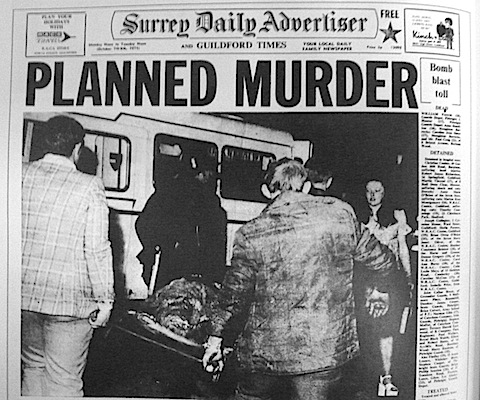
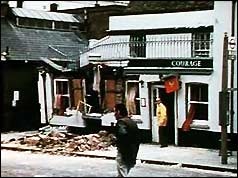
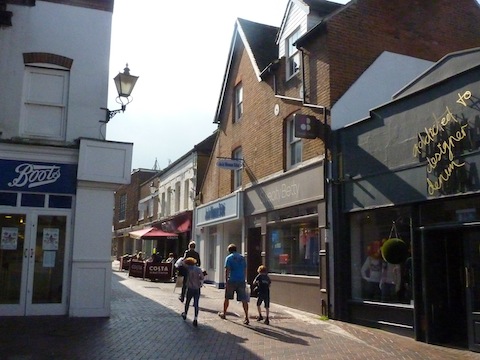
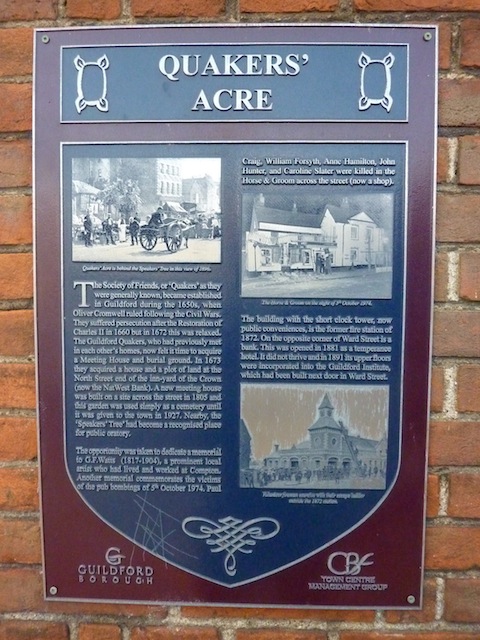



Colin Reardon
October 6, 2014 at 2:56 pm
We got married on 5 October 1974 in Emmanuel Church, Stoughton so yesterday was our Ruby Wedding Anniversary. We didn’t know about the bombings until we returned from honeymoon two weeks later. There was no internet or mobile phones then!
Some of our guests went into Guildford after the reception and only just missed the bomb going off at the Horse and Groom as it was so busy they decided to walk on to the White Hart instead – a very lucky decision.
Bob Hind
October 7, 2014 at 3:21 am
I was in the Horse and Groom that night but thankfully about 6pm.
I had just finished work in Bernard’s Butchers and went for a pint before catching the bus to Old Woking. I was shocked when I saw the news later that evening.
The pub was always a convivial place to have a drink after a hard day and was always packed around tea time.
I don’t think the bombers were ever caught and the Guildford Four were mere scapegoats. It was a bad time for all concerned.
Stuart Barnes
October 13, 2014 at 9:32 am
Some people are of the opinion that the murderers were caught but escaped justice partly because of political expediency.
Roland McKinney
October 7, 2014 at 1:17 pm
Although not an Ulsterman by birth or by residence, my family roots are there, and I retain something of an Ulster accent from my youth.
I don’t wish to comment on the bombing itself, other than to say it was a cowardly act, and that I will never understand why the cowards who carried acts like these have been treated by many as heroes: they were not then and are not now. Rather, I want to comment on the sad story of Jim being beaten up for being Irish.
I was not a Surrey resident then, but lived in England though some of the worst atrocities committed here. In all that time I never, ever, had any English (whoever they may be) say anything negative to me, despite my accent, and have been chastened by the tolerance shown by the “English”. Wonderful people, and I can never adequately express my gratitude for the tolerance displayed.
Jim had some bad luck on what may have been the luckiest night of his life.
Ann Williams
June 6, 2019 at 10:31 pm
I was in the Horse and Groom [public house] that evening and I was sitting with a friend Yvonne Tucker, both on our first night out from basic training.
I was a casualty and sent to the Cambridge Military Hospital. I never found what happened to her.